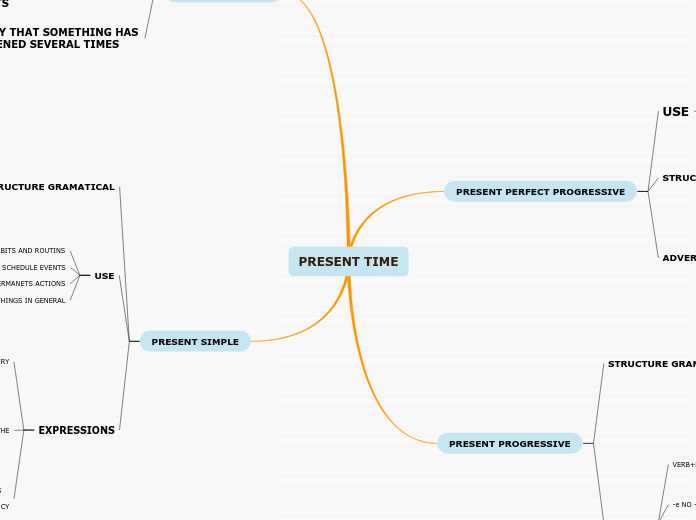PRESENT TIME
PRESENT PERFECT PROGRESSIVE
USE
Is used to say actions that have started in
the past but continou in the present.
STRUCTURE GRAMATICAL
AFFIRMATIVE
He has been dreaming today
We have been traveling to Colombia
NEGATIVE
He hasn't been dreaming today
We haven't been traveling to Colombia
INTERROGATIVE
Has He been dreaming today?
Have been traveling to Colombia?
ADVERBS EXPRESSIONS
FOR
Is used to express the duration of an
activity we can say the amount of time.
SINCE
Is used to express the specific
moment in which said action began.
PRESENT PROGRESSIVE
STRUCTURE GRAMATICAL
NEGATIVE
I'm not reading a book
He isn't reading a book
We aren't reading a book
AFIRMATIVE
I'm reading a book
She is reading a book
We are reading a book
INTERROGATIVE
am I reading a book?
Is She reading a book?
Are we reading a book?
DOING
VERB+ing
_Do-Doing
_Play-Playing
_Read-Reading
_Work-Working
-e NO -e+ing
_Have-Having
_Shave-Shaving
_Share-Sharing
_Take-Taking
-ie Change to y+ing
_Die-Dying
_Lie-Lying
One sylable ends with 1 vowel and
1 consonant dividethe last consnant
_Get-Getting
_Stop-Stopping
_Run-Running
PRESENT PERFECT
TO TALK ABOT RECENT A STATE THAT STARTED IN THE PAST AND CONTINOUS UNTIL NOW
SINCE
I have played cricket since I was a child
FOR
Fabiola has skated for years
TO TALK ABOUT RECENT PAST EVENTS
RECENTLY
She has recnently changed jobs
JUST
I've just finished lunch, I'm not hungry
ALREADY
I have already read that book
TO SAY THAT SOMETHING HAS HAPPENED SEVERAL TIMES
SO FAR
So far this morning, I have mande 3 phone calls
PRESENT SIMPLE
STRUCTURE GRAMATICAL
AFIRMATIVE
She reads the newspaper every day
I read the newspaper every day
NEGATIVE
She doesn´t read the newspaper every day
I don't read the newspaper every day
INTERROGATIVE
Does She read the newspaper every day?
Do I read the newspaper in the every day?
USE
HABITS AND ROUTINS
I always study hurt
SCHEDULE EVENTS
The train leaves every morning
PERMANETS ACTIONS
Rodrigo lives in Tamaulipa
THINGS IN GENERAL
An ice cube exposed to the sun exits
EXPRESSIONS
EVERY
Day
Night
Morning
Week
Month
Year
IN THE
Morning
Night
ADVERBS
OF
FRECUENCY
Always
Sometimes
Never
Rarely
Usually
Often
